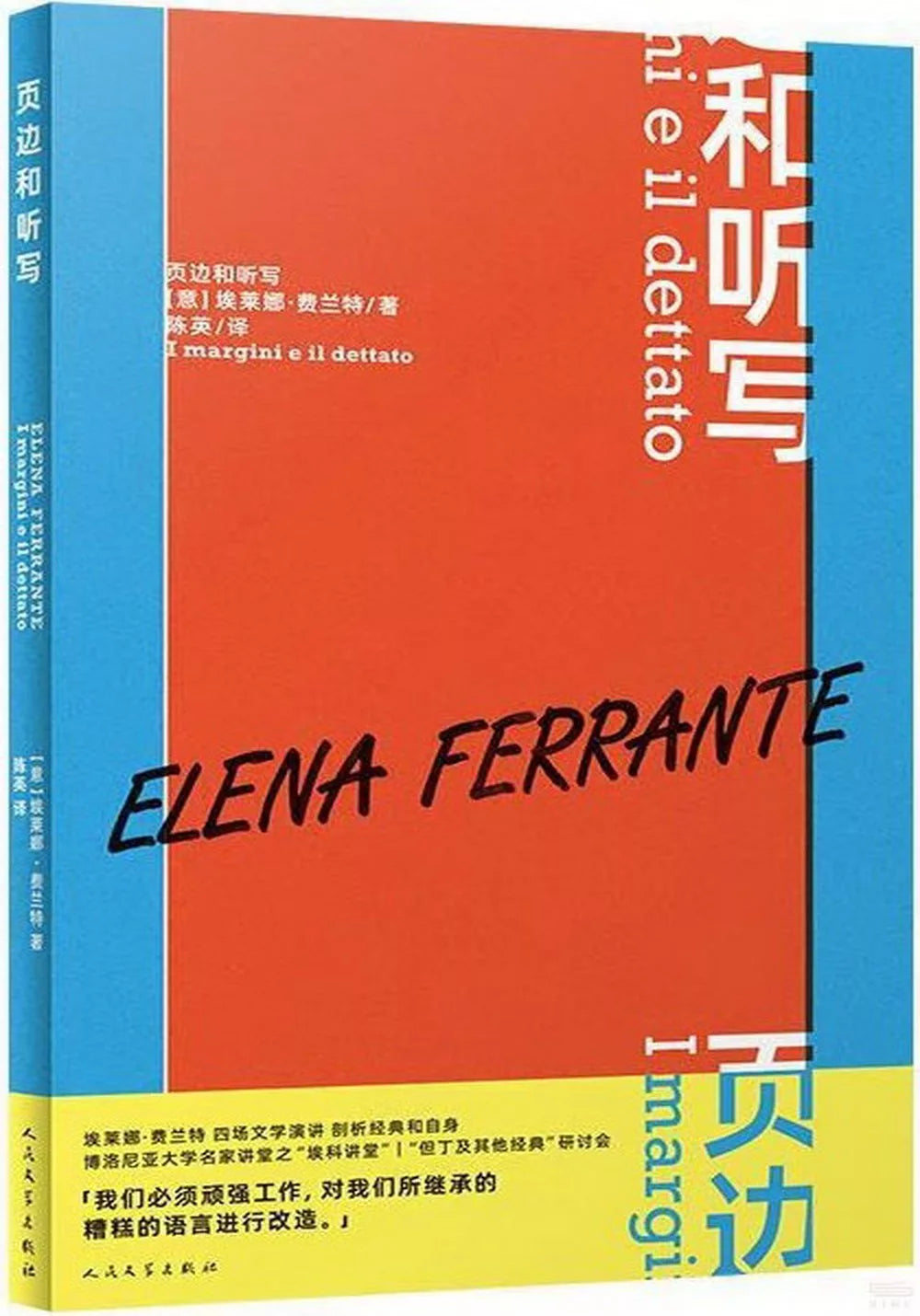1
/
of
1
Margins and Dictation
Margins and Dictation
[Italian] Elena Ferrante Chen Ying 译
Regular price
$11.99 USD
Regular price
Sale price
$11.99 USD
Unit price
/
per
Low stock
Couldn't load pickup availability
About Book
About Book
★ Four special lectures by Elena Ferrante read by others during the COVID-19 pandemic★ "Pain and the Pen," "Sapphire," "History and I" | Le Eco Lectures (Università di Bologna)
Dante's Rib|Dante and Other Classics Symposium (ADI)
"We must work tenaciously to reform the poor language we have inherited."
Ferrante pays tribute to and revisits the writers who inspired her: Emily Dickinson, Gertrude Stein, Ingeborg Bachmann, Denis Diderot, Laurence Sterne, Italo Svevo, Adriana Cavarero, Dostoyevsky, Dante…
****
In 2020, Elena Ferrante accepted the invitation of the Eco Lecture Series at the University of Bologna and delivered three lectures, read aloud by others: "Pain and the Pen," "Sapphire," and "History and I." Drawing on her own history of reading and writing, the author identified key themes such as "Speaking the Truth," "The Witchcraft We Need," and "The Necessary Other." By elaborating on the influence of writers like Gertrude Stein, Ingeborg Bachmann, Laurence Sterne, Italo Svevo, and Adriana Caballero, the author connected her own writing process with classic works.
The book also includes an appendix, "Dante's Rib," a speech Ferrante delivered at the "Dante and Other Classics" symposium (April 29, 2021), at the invitation of the Association of Italian Studies (ADI). Read by scholar Tiziana Delocatis, Ferrante explains how Dante broke with his own poetic tradition, imagined the wisdom and possibilities of women's lives, and ultimately created the immortal literary figure of Beatrice.
***
We must accept the fact that no words truly belong to us. We must abandon the idea that writing is about miraculously finding your own voice, your own tone. This seems to me to be a weary way of talking about writing. Quite the opposite: writing is about stepping each time into an endless cemetery where every grave awaits desecration; writing is about immersing yourself in all the novels, essays, and plays that have ever been written, great and lesser literature (wherever applicable), and forming your own writing in the swirling complexity of your personality; writing is about taking possession of everything that has ever been written, and slowly learning to use this immense wealth. —Elena Ferrante
For a long time, we must suspend the distinction between writers who write mediocre works and those who write masterpieces. Together, we must fight the terrible language that has historically failed to accept women's truths. We must blend with each other, blend our talents together, and not let a single line disappear in the wind. We can do it. —Elena Ferrante
Dante's Rib|Dante and Other Classics Symposium (ADI)
"We must work tenaciously to reform the poor language we have inherited."
Ferrante pays tribute to and revisits the writers who inspired her: Emily Dickinson, Gertrude Stein, Ingeborg Bachmann, Denis Diderot, Laurence Sterne, Italo Svevo, Adriana Cavarero, Dostoyevsky, Dante…
****
In 2020, Elena Ferrante accepted the invitation of the Eco Lecture Series at the University of Bologna and delivered three lectures, read aloud by others: "Pain and the Pen," "Sapphire," and "History and I." Drawing on her own history of reading and writing, the author identified key themes such as "Speaking the Truth," "The Witchcraft We Need," and "The Necessary Other." By elaborating on the influence of writers like Gertrude Stein, Ingeborg Bachmann, Laurence Sterne, Italo Svevo, and Adriana Caballero, the author connected her own writing process with classic works.
The book also includes an appendix, "Dante's Rib," a speech Ferrante delivered at the "Dante and Other Classics" symposium (April 29, 2021), at the invitation of the Association of Italian Studies (ADI). Read by scholar Tiziana Delocatis, Ferrante explains how Dante broke with his own poetic tradition, imagined the wisdom and possibilities of women's lives, and ultimately created the immortal literary figure of Beatrice.
***
We must accept the fact that no words truly belong to us. We must abandon the idea that writing is about miraculously finding your own voice, your own tone. This seems to me to be a weary way of talking about writing. Quite the opposite: writing is about stepping each time into an endless cemetery where every grave awaits desecration; writing is about immersing yourself in all the novels, essays, and plays that have ever been written, great and lesser literature (wherever applicable), and forming your own writing in the swirling complexity of your personality; writing is about taking possession of everything that has ever been written, and slowly learning to use this immense wealth. —Elena Ferrante
For a long time, we must suspend the distinction between writers who write mediocre works and those who write masterpieces. Together, we must fight the terrible language that has historically failed to accept women's truths. We must blend with each other, blend our talents together, and not let a single line disappear in the wind. We can do it. —Elena Ferrante
Publication Date
Publication Date
2024-08-01
Publisher
Publisher
人民文学出版社
Imprint
Imprint
99 Readers
Pages
Pages
132
ISBN
ISBN
9787020188239
share

